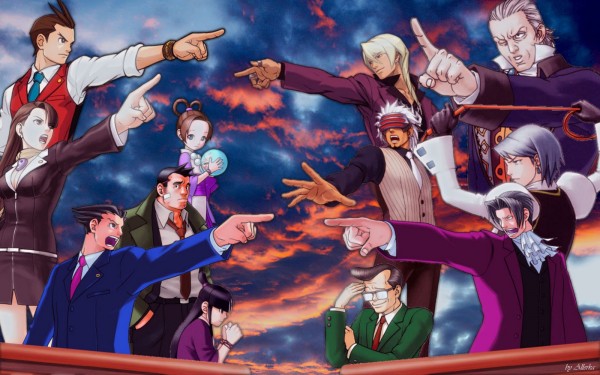I saw the buzz about this yesterday and thought I’d throw my 2-cents into the mix (’cause that’s how I roll).

Phoenix Wright wallpaper image courtesy of Allerka.
When ADV closed shop, I thought it was very odd that they didn’t truly close shop, but instead became several, smaller companies, one of which is Sentai. It made no sense to me unless there were some shenanigans of some kind going on. However, at the time, I decided that since the licensing of anime would continue, I would just ignore this and move along.
This brings me to FUNimation’s lawsuit, which more information can be read about on ANN’s site. What caught my attention was this blurb.
In the lawsuit, Funimation claims that ARM also gave Funimation the right to enforce ARM’s agreement with ADV, specifically in regard to the debt that ADV owed ARM — making Funimation a creditor. The suit alleges that ADV never paid this debt, and instead sold its assets for below market price to several companies owned by former ADV executives and shut down.
The suit goes on to claim that ADV‘s transfer of assets “was made with the intent to defer, hinder or defraud the creditors of ADV,” including Funimation, and that the new companies “succeeded ADV‘s contractual liability” in regard to the outstanding debt.
Immediately, I remembered my thinking of how odd ADV’s shut down and rebirth was. If FUNimation proves its case, then it would explain everything. Too often, legal trickery is used to try to skirt the law. I’ve known of elderly folks who’ve signed up for these “asset protection” things to try to protect themselves from massive taxation or the like, only to either end up destitute when Big Brother comes in demanding their money, or to have the assets they worked a lifetime to acquire suddenly owned by a law firm. (If they are lucky, these elderly people have folks who care about them, and who will do what it takes to get the government/lawyers off the backs of these elderly folks.)
My point is that it is possible that when ADV found itself in financial hot water, the powers that be devised a legal trickery strategy to try to avoid debt and remain a player. Such things take a long time to unravel, but I’m guessing that FUNimation’s and ARM’s lawyers feel they have a pretty good case, and if correct, $8-million is something they can’t pass up on collecting, if they are owed this.
It is up to the courts to determine whether or not FUNimation/ARM have a legitimate case or not. Sentai, of course, is claiming the lawsuit is without merit, and they may be right. However, the appearance of chicanery in ADV’s breakup into Sentai and other companies does smell a lot like trying to avoid debt or other legal issues.
Regardless, I’m going to try to follow this case. I expect it will take a while to resolve though.



 January 14th, 2012
January 14th, 2012  AstroNerdBoy
AstroNerdBoy  Posted in
Posted in  Tags:
Tags: 
Aye… if ADV owed several million dollars and its successor shell companies have reneged on repayment, that seems like prima facie evidence of shenanigans.
Shenanigans indeed. ADV/Sentai etc shouldn’t be allowed to cop out of their financial woes so easily, and other companies shouldnt have to pay the price of the ADV/Sojitz deal falling flat on its face.
there should be an international law against companies avoiding debt by going into administration, only to start up again under a different name. sometimes a name change is all it takes for them to get away with it. As long as the original company is dead, the new company could run 100% like the old one with only a name change. its stupid but somehow its law.
Trying to create an international against the sort of thing would be interesting, if because in many countries, the type of switcheroo is a feature, not a bug, of their legal system. Those governments sure are not going to support something like that. And that is assuming the government in question is not explicitly supporting that sort of thing – Russia comes to mind.